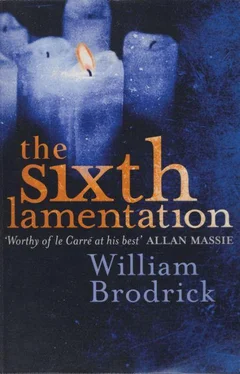William Brodrick - The Sixth Lamentation
Здесь есть возможность читать онлайн «William Brodrick - The Sixth Lamentation» весь текст электронной книги совершенно бесплатно (целиком полную версию без сокращений). В некоторых случаях можно слушать аудио, скачать через торрент в формате fb2 и присутствует краткое содержание. Жанр: Триллер, на английском языке. Описание произведения, (предисловие) а так же отзывы посетителей доступны на портале библиотеки ЛибКат.
- Название:The Sixth Lamentation
- Автор:
- Жанр:
- Год:неизвестен
- ISBN:нет данных
- Рейтинг книги:5 / 5. Голосов: 1
-
Избранное:Добавить в избранное
- Отзывы:
-
Ваша оценка:
- 100
- 1
- 2
- 3
- 4
- 5
The Sixth Lamentation: краткое содержание, описание и аннотация
Предлагаем к чтению аннотацию, описание, краткое содержание или предисловие (зависит от того, что написал сам автор книги «The Sixth Lamentation»). Если вы не нашли необходимую информацию о книге — напишите в комментариях, мы постараемся отыскать её.
The Sixth Lamentation — читать онлайн бесплатно полную книгу (весь текст) целиком
Ниже представлен текст книги, разбитый по страницам. Система сохранения места последней прочитанной страницы, позволяет с удобством читать онлайн бесплатно книгу «The Sixth Lamentation», без необходимости каждый раз заново искать на чём Вы остановились. Поставьте закладку, и сможете в любой момент перейти на страницу, на которой закончили чтение.
Интервал:
Закладка:
‘We’re allowed to come here for a few days at a time. There’s tap water, a stove, a couple of chairs and a bed… little else.’
They sat in the shade of the veranda, and Anselm asked, ‘Did you ever find out anything about your family… those you lost?’
‘We only ever talked of them once,’ said Salomon Lachaise. ‘I asked, late one night when I was in bed. She said, “Get up and put your coat on.” I did. Back we went to the shop. She pulled out a cardboard box of photographs and a menorah… and there, by the dim light of eight candles, she gave me through tears the names for the faces… then she put them back under the counter. That was as far as she could go.’
‘She kept them in the shop?’
As if explaining what should not be uttered, he replied, ‘She spent her waking life there, in that cavern.
Anselm held in his mind the image of a woman, alone, the till counted, ready for home. She locks herself in, comes back, lights the candles and reaches for the box, that lid. Ah, thought Anselm… that’s why she turned the key… to let her tears free. He said, ‘So you never learned anything about them?’
‘No. At first, I constructed lives for them. Later, I took refuge in learning. It was a most remarkable sensation that only left me as I got older, but I would read through the night as if those strangers of my blood were there in the room, inhabiting the shadows. That is how I reclaimed them for myself. And, with their help, I did well at school. It was said I had considerable promise.
‘That must have been a joy for your mother.’
‘It was. But there was very little money around. I was expected to work in the shop, but then… my life changed.’
‘What happened?’ asked Anselm.
‘Something extraordinary. At the beginning of the term I was due to leave school I was summoned to the headmaster’s office. Sitting in his chair was a wiry fellow with a stiff, self-important manner — a lawyer, it turned out — who had come on his client’s behalf to see me. His message was simple enough. He had received funds from “a survivor” to secure me a university education.’
Anselm, marvelling, said, ‘Some would call that a blessing.’
‘Indeed,’ replied Salomon Lachaise with a numinous, inquisitive smile. ‘So you would. My mother did the same. She spent the remainder of her days trawling over the names of all those she had helped, wondering who it might have been so she might thank them. She saw a door open before me, and in due course I passed through to a whole life, a whole universe I would never have otherwise known.’
‘And your patron’s identity remained a secret?’
‘Yes.’
Salomon Lachaise explained that the lawyer had entrusted administration of the finances to a local solicitor of his choosing — insisting on separate representation in case a conflict of interest arose between his client and the young Lachaise.
‘And that is how I met a wonderful man, Josef Bremer, who became something of a father to me. All my life he has been a source of advice and encouragement.’
‘Incredible,’ said Anselm. ‘Whoever it was probably knew your mother, knew you, and just did it, forsaking recognition or repayment. It is the sort of thing that makes life worth living.’
‘And worth the dying.’
Anselm had the strange sensation of something hot having passed him by A trace was left behind, slightly acrid, like exhaust from an engine, but then it was gone, quickly dispersed by a breath of air. Salomon Lachaise said:
‘I found my home in the art of the Middle Ages. It has brought me great joy… and pain… always the bitter and the sweet.’
Not entirely sure the true meaning of the words had reached him, Anselm thought of the rivalry of academics, known to surpass even that of children. Consolingly he said, ‘Like all homes.’
‘And, no doubt, like all monasteries,’ said Lachaise.
‘Verily’ Automatically, insensitively, Anselm said, ‘You remained alone?’
‘Yes… although I nearly got married once…
‘What happened?’
After a thoughtful pause, Salomon Lachaise said, ‘She ran off with the maths teacher.’
‘Oh dear.’
They both looked at each other and burst into ringing laughter.
2
Evening light came with a faint chill. Together they retraced their steps through the fields, away from The Hermitage crouching by the stream. When they had gone a fair distance Salomon Lachaise stopped and turned, as though taking a mental snapshot of a place to hide.
Anselm said, ‘I meant to say sorry for the fact that… he is here at all.’
‘Thank you. I have to say your Prior must be singularly unconcerned about appearances.’
‘He is, actually But it wasn’t his decision.’
‘I see.’
Tact and a sudden disquiet prevented Anselm from disclosing that it had been the Vatican’s proposal. He simply said, ‘I know it looks bad.’
‘Perhaps it is bad,’ said Salomon Lachaise. ‘For someone like me it could so easily belong with all the other springs of lamentation which, I am afraid, are not simple misunderstandings. ‘
‘What do you mean?’ asked Anselm apprehensively Immediately he wished he’d let the matter pass.
‘There are too many to mention… they run wildly one into the other, from the first charge of deicide… to the expulsions of the Middle Ages… through to the complicated time of anguish, silence and diplomacy In my own way I, too, have known these.’
It was the old agonising problem for Anselm. He was forever confronting the face of a church to which he belonged, many of whose features he did not wholly recognise. He said, ‘I hope Larkwood offers you something different, another kind of spring.’
Salomon Lachaise, glancing over his shoulder, said, ‘I have already discovered one, in a place I least expected to find it.’
They walked on, the light swiftly thinning, the mad swooping of distant birds suddenly ended, leaving the sky bare, unscored. The high monastery wall grew larger, a dam between great banks of trees.
Salomon Lachaise said, ‘Do you know which great romance of literature emerges beside the pogroms of the Middle Ages as they erupted across Britain, France and the Rhineland?’
‘I’m afraid not.’
‘It is the poetry of the mystic king… Arthur, The Round Table and the Grail.’
‘How strange. ‘
‘It’s as though the attacks upon the Jews and medieval chivalry belonged to the same cultural flowering. And then, fifty years ago, some genius set up a Round Table to save the Jews, to redeem its association with ancient hostility.’
Anselm, intrigued, glanced at his companion. Lachaise’s head was lowered, his face dark as he said, ‘Isn’t it all the more tragic, then, that the person who broke it apart was-’
Anselm finished the complaint, to demonstrate his understanding, his profound regret, ‘-able to find refuge in the arms of the Church.’
Salomon Lachaise seemed not to have heard. They had reached the oak door in the wall. Anselm forced in the key and turned it heavily They parted, promising to meet again, and Anselm felt the slow, piercing influx of shame: he had quite deliberately said nothing about his planned trip to Rome, which had imperceptibly come to present itself as something disagreeable. Unable to shake off the discomfort, he hurried back to the Priory. Climbing the spiral stone stairs to his room, it dawned on him that Salomon Lachaise had told him everything, and yet, with calculation, with regret, he had told him nothing.
Chapter Eleven
The first notebook of Agnes Embleton.
20th April.
How can I now think of my Jewish comrades as different from the rest of us? For we were one group. The fact is they had been hunted, we had not, and the hunt was still on. I suppose I too should have been scared, because I was, am, half Jewish. But my identity on that level was indistinct. The inks had run together. I discovered just how separate they were one morning when looking through Madame Klein’s desk for a letter opener. I found a baptismal certificate in my name, one in my mother’s, a marriage certificate for my parents, and a death certificate for my mother. A whole Christian history lived out in Normandy I saw the scheming hand of Father Rochet, although I couldn’t imagine how he’d done it. Pretending to be cross, I asked him, ‘Why?’ He grabbed me by each arm and the smell of stale wine hit me in the face. ‘I hope to God you’ll never need them,’ he snapped. ‘These are dark times, Agnes. If you doubt me, read widely Read what others are thinking in the streets you walk.’ That night he gave me Celine’s Bagatelles pour un massacre. It described France as a woman raped by Jews, looking to
Читать дальшеИнтервал:
Закладка:
Похожие книги на «The Sixth Lamentation»
Представляем Вашему вниманию похожие книги на «The Sixth Lamentation» списком для выбора. Мы отобрали схожую по названию и смыслу литературу в надежде предоставить читателям больше вариантов отыскать новые, интересные, ещё непрочитанные произведения.
Обсуждение, отзывы о книге «The Sixth Lamentation» и просто собственные мнения читателей. Оставьте ваши комментарии, напишите, что Вы думаете о произведении, его смысле или главных героях. Укажите что конкретно понравилось, а что нет, и почему Вы так считаете.












